The five founders of the ICRC: Gustave Moynier (top left), Louis Appia (bottom left), Guillaume-Henri Dufour (centre), Henry Dunant (top right), and Théodore Maunoir (bottom right). The ICRC was founded on 17 February 1863 in Geneva.
The ICRC: 150 years of humanitarian action
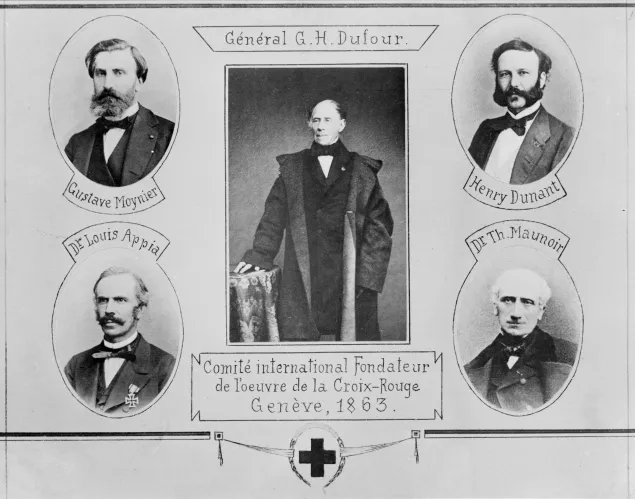
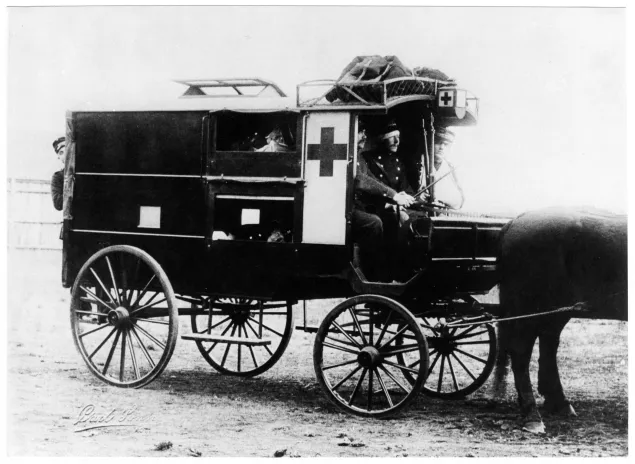
Danish military ambulance, 1878. The 1864 Geneva Convention established a unique distinctive emblem (a red cross on a white background) for ambulances, hospitals and medical personnel. Other emblems were introduced at a later date, in particular the red crescent on a white background.
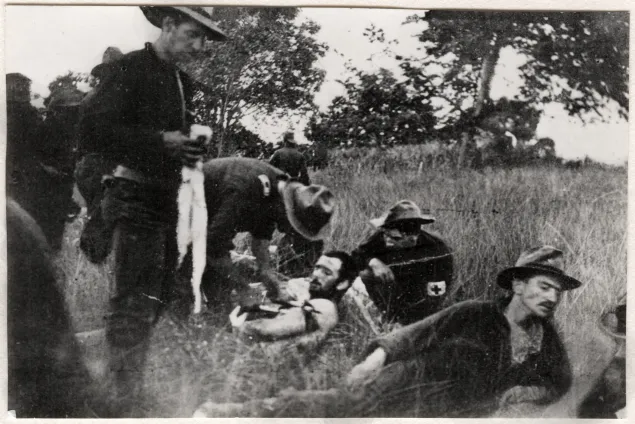
The Spanish-American War of 1898. A surgeon from the United States army medical service (recognizable by his red cross) treats a wounded soldier in a field hospital.
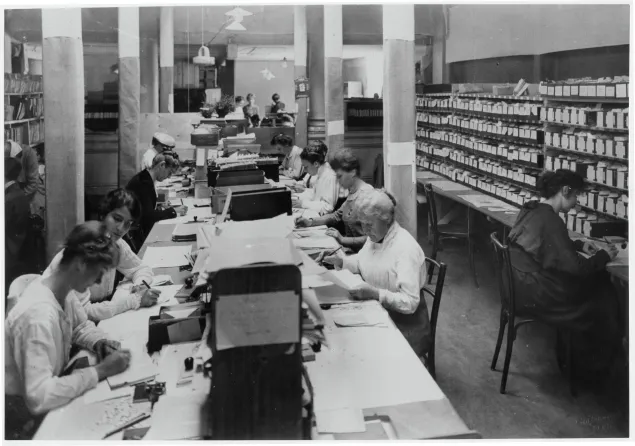
First World War, 1914-1918: Rath Museum, Geneva, 1949. International Prisoner-of-War Agency. The Agency was set up by the ICRC to record the details of prisoners of war, trace their families and enable them to exchange news.
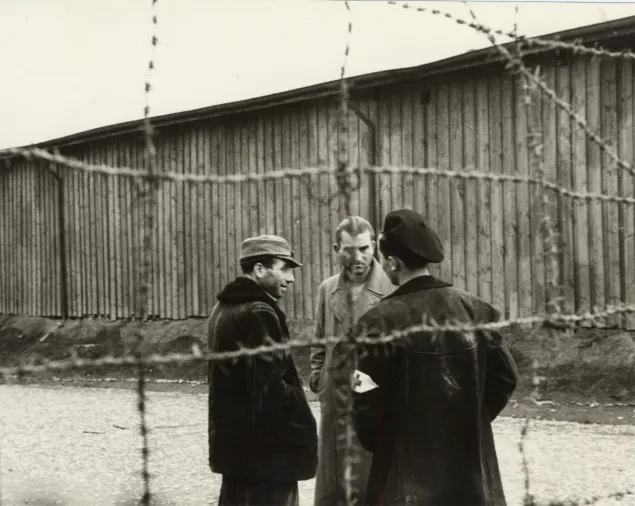
Second World War, 1939-1945. Germany. An ICRC delegate visits a prisoner-of-war camp. The ICRC made more than 11,000 such visits during and immediately following the war.
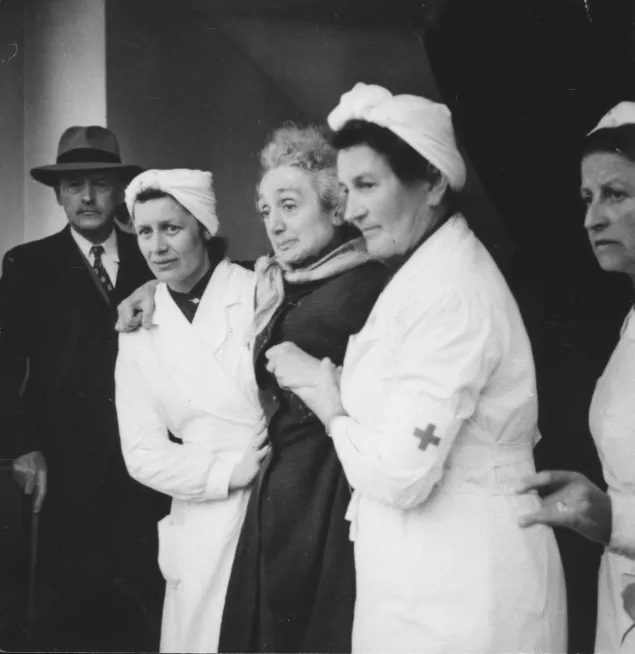
ICRC accompanies 300 survivors of Ravensbrück concentration camp to Switzerland. The ICRC, and the international community as a whole, failed to take sufficient and timely action in the face of mass civilian deportations to Nazi concentration camps.
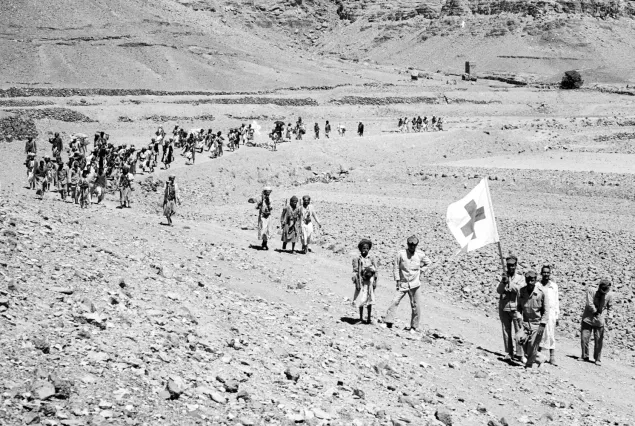
Yemen Civil War, 1962-1970. 1965. Egyptian prisoners of war are repatriated under the auspices of the ICRC. Alongside its usual activities to help prisoners of war, the ICRC also provided health care for civilians, such as by setting up a field hospital and fully equipped operating theatre in the middle of the desert in Uqd.
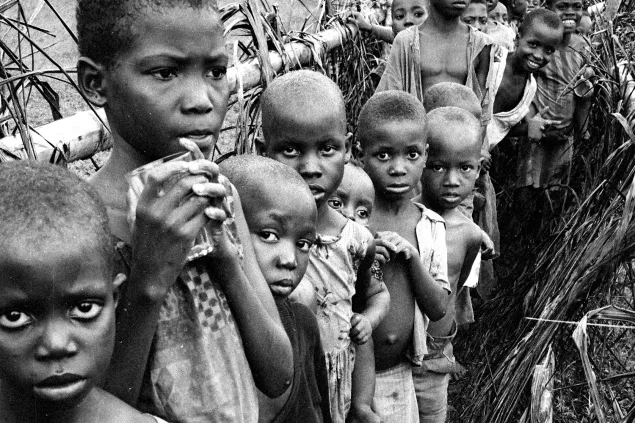
Nigerian Civil War, 1967-1970. Umuosu, September-October 1968. Food distribution in a feeding centre. During the Nigerian Civil War, also known as the Biafran War, the ICRC conducted one of its biggest civilian relief operations.
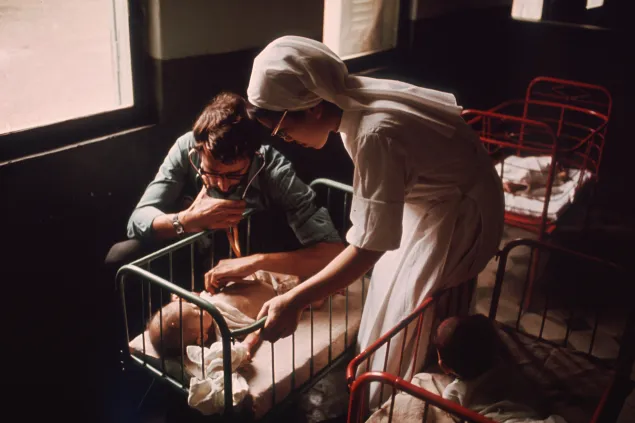
Vietnam War, 1964-1975. Saigon, 1969. An ICRC doctor visits an orphanage. Throughout the war, the ICRC was only able to work in the Republic of Vietnam (or South Vietnam), despite repeated appeals to the North Vietnamese government.
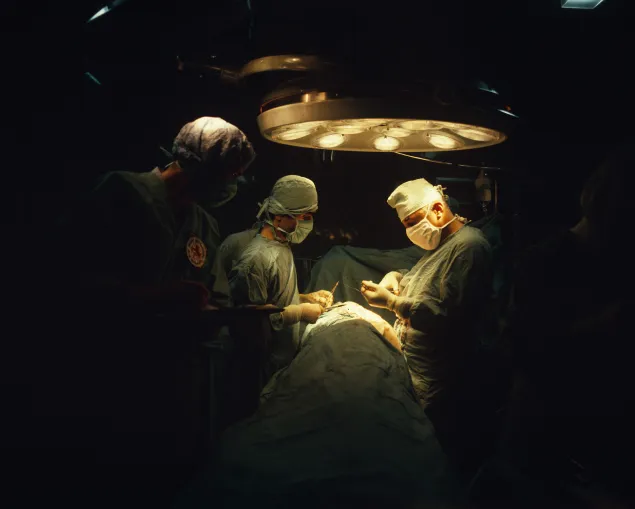
Lebanese Civil War, 1975-1990. Zahra hospital, southern Beirut, 1984. An ICRC surgical team operates on a war-wounded patient. From the 1970s, war surgery became one of the ICRC's main activities.
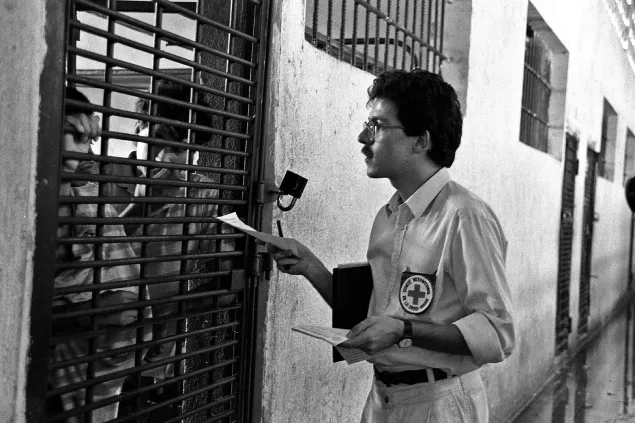
Contras rebellion, 1979-1990. Juigalpa prison, Nicaragua, 1990. An ICRC delegate talks to security detainees. The ICRC started working in Nicaragua in the summer of 1978. The Managua delegation closed its doors in December 1991, after calm was restored to the country.
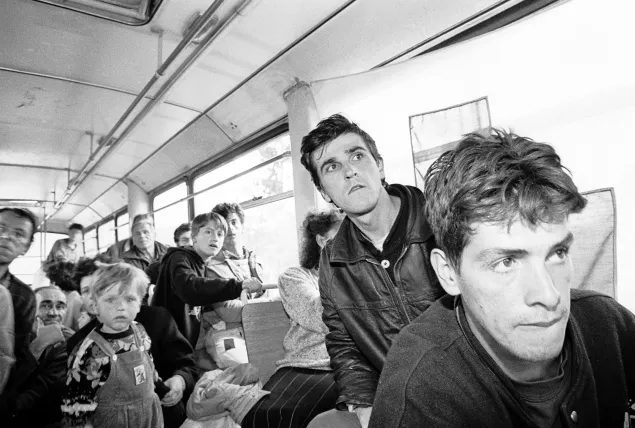
Bosnian War, 1992-1995. Poculica, Bosnia, 1993. The ICRC evacuates former detainees, women and children from Zenica. In the first half of the 1990s the ICRC carried out one of its biggest operations in response to the conflicts in the former Yugoslavia.
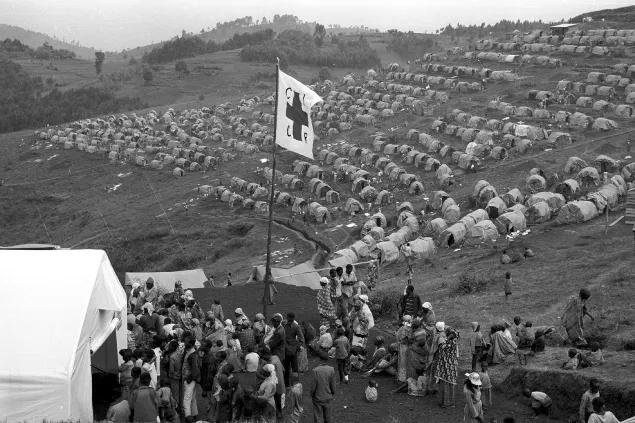
Rwandan genocide, 1994. An ICRC medical unit in a camp for displaced people in Cyangugu. ICRC staff were present in the country during the massacre of 800,000 people and tried to help the people targeted by the killings or forced to flee their homes.
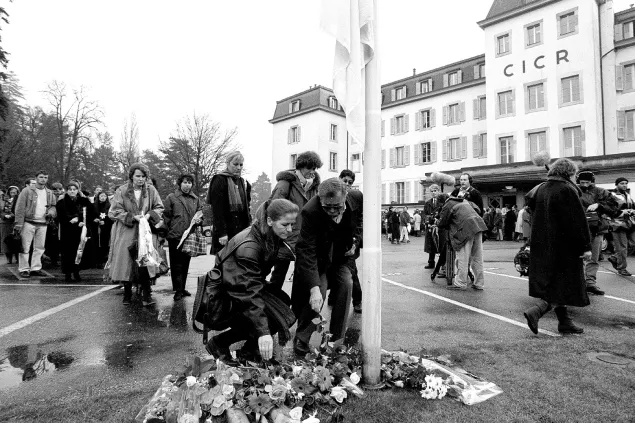
ICRC headquarters. Geneva, 20 December 1996. Silent walk in memory of six ICRC delegates murdered on 17 December 1996 in Novye Atagi hospital, Chechnya.
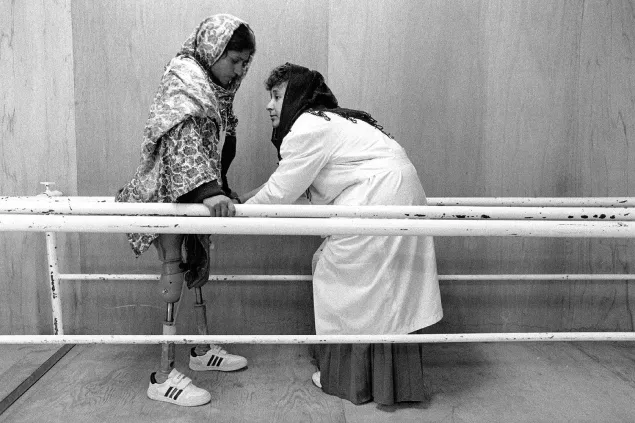
© ICRC / J. Nachtwey / af-e-00749
Afghanistan Civil War, 1992-1996. Wazir Akbar Khan hospital, Kabul, 1996. ICRC-supported physical rehabilitation centre. Since the early 1970s, the ICRC has been running physical rehabilitation programmes for civilians wounded in the fighting or by anti-personnel mines.
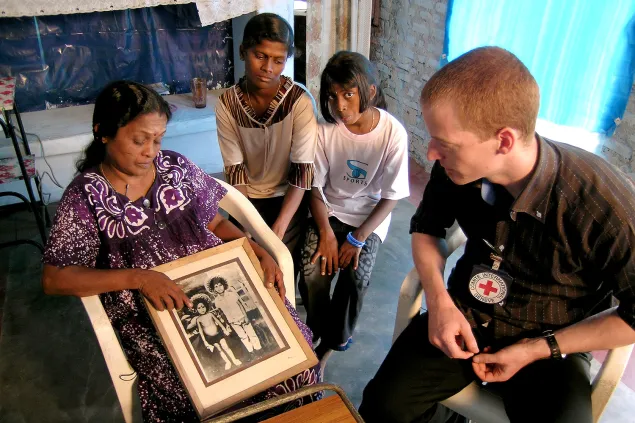
Sri Lankan Civil War, 1983-2009. Pandiruppu, near Kalmunai, 2004. An ICRC delegate visits a family in which two sons are missing in connection with the conflict. Ascertaining the fate of missing persons, offering material and psychosocial support to their families, and identifying remains are all part of the ICRC's work, especially in post-conflict situations.
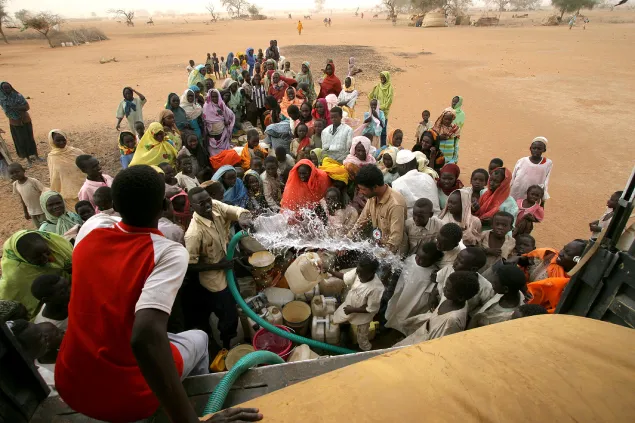
Civil war in the Darfur region of Sudan, 2003 to present. Gereida camp for displaced people, 2006. People wait in line for water distributed by the ICRC. There are more than 90,000 people in the camp. The ICRC provides water and relief items, as well as running a field hospital.
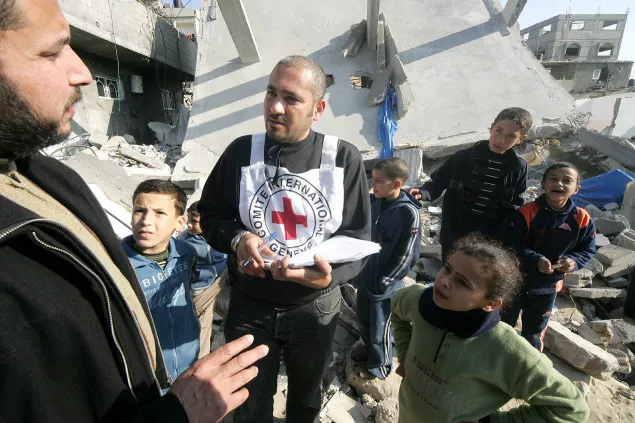
Gaza, 20 January 2009. ICRC delegates assess the damage and gather residents' accounts of the Israeli military offensive. On the basis of this information, the ICRC then embarked on bilateral discussions about the conduct of hostilities with both the Israeli authorities and Hamas.
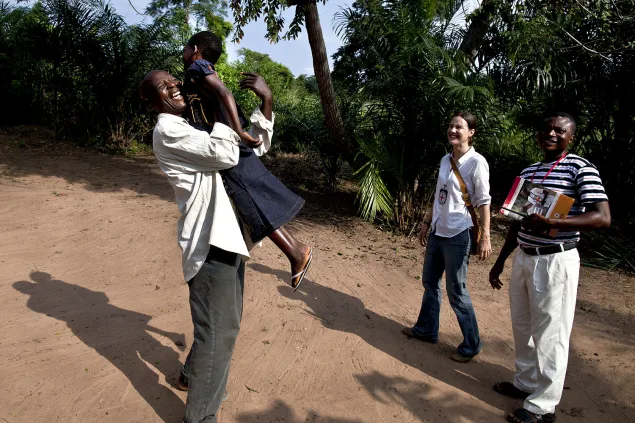
Democratic Republic of the Congo, 2011. With the help of the ICRC, a nine-year-old girl is reunited with her uncle. She became separated from her family in the wake of the intercommunal violence in 2009 in the Dongo region, which drove 165,000 people from their homes.
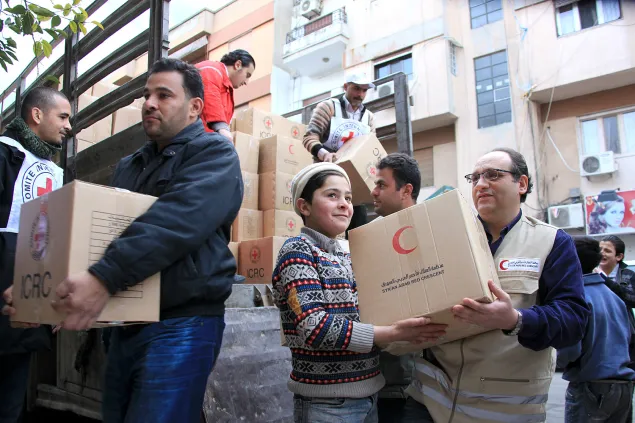
Syrian conflict, 2011 to present. The Al-Ghuta neighbourhood of Homs, 15 February 2012. Volunteers from the Syrian Arab Red Crescent and local residents unload food supplies. The ICRC often works closely with the National Red Cross or Red Crescent Society of the country in which it is operating.
For 150 years the ICRC has been striving to alleviate the suffering of victims of war and violence, wherever they may be. Initially restricted to caring for sick and wounded soldiers on the battlefield, the scope of the ICRC's work quickly grew to include other groups caught up in war and its consequences. The constantly changing nature of war and other violence has continually thrown up new challenges for humanitarian action. Throughout this time, the ICRC has tirelessly adapted to the latest developments, with the sole aim of protecting and assisting people affected by armed conflict.



